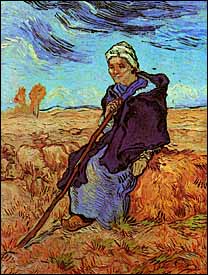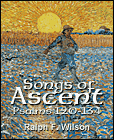
|
Old Testament
New Testament
Gospels
Acts
Paul's Letters
General Letters
Revelation
Topical Studies
Beginning the Journey (for new Christians). en Español

|
Old Testament
New Testament
Gospels
Acts
Paul's Letters
General Letters
Revelation
Topical Studies

|
Home
Bible Studies
Articles
Books
Podcasts
Search
Menu
Donate
About Us
Contact Us
FAQ
Sitemap
12. Psalm 131. Quieting Our Soul in the Lord
 Vincent Van Gogh, 'The Shepherdess (after Millet)' (1889), oil on canvas, 52 x 40 cm, Tel Aviv Museum, loaned by Moshe Mayer, Geneva. |
The Psalms are about trust. They are penned in all sorts of circumstances, many of them in times of crisis when nerves are on edge and fear is nibbling at the heart. This psalm, attributed to David, is about finding peace in the midst of trouble. And David had seen a lot of trouble in his life.
"A Song of Ascents. Of David.
1 O LORD, my heart is not lifted up;
my eyes are not raised too high;
I do not occupy myself
with things too great and too marvelous for me.
2 But I have calmed and quieted my soul,
like a weaned child with its mother;
like a weaned child is my soul within me.
3 O Israel, hope in the LORD
from this time forth and forevermore." (Psalm 131:1-3, ESV)
Humility and Trust (Psalm 131:1)
The psalm begins with an attitude of humility. We can't rest when we feel we have to be in control. We can't relax when we have to feel like we're in charge.
"O LORD, my heart is not lifted up;
my eyes are not raised too high;149
I do not occupy myself with things
too great and too marvelous150 for me." (Psalm 131:1)
Resting in God begins with humility -- and perspective. David isn't talking about squelching normal curiosity and inquiry. But sometimes there comes a point of obsession where we must understand, where knowledge seems like control of the chaos. And sometimes we think we understand by over-simplifying complex things.
But there are some matters that are either too hidden or too complex for us to understand. I may not have the education needed. Or perhaps it's something that no one really understands, not even the cutting edge scientists. There are some things beyond my knowledge.
Sometimes I listen to dogmatic Christian teachers who have the whole Bible figured out. They have an answer for everything. Some listeners are awed by such "knowledge," but at my age I know better. Some things about Scripture we just are not told. To try to fill in the blanks is dangerous, since often it is mere speculation dressed up as fact and "deep truth." There is a time to say, "We just don't know." Appropriate humility.
Life and relationships can often be in that category. Why doesn't he love me? Why did Aunt Alice have to die? Why did this happen to me? What did I do to deserve this? Sometimes well-meaning believers answer: "It's God's will!" But everything that happens isn't God's perfect will. There is evil in the world. There is an enemy at work. Things aren't so simple. Often we just don't know "why."
Once common reaction is anger towards God, sometimes bitterness that lasts for decades. But anger doesn't help anything, especially understanding and restoring a trusting relationship with God. Perhaps a better question than "Why?" might be, "What can I learn from this, God?"
That's what David is talking about here.
"O LORD, my heart is not lifted up;
my eyes are not raised too high;
I do not occupy myself
with things too great and too marvelous for me." (Psalm 131:1)
Pride demands an answer and is angry if one is not forthcoming. Humility recognizes that there are things I can't fathom or control. David teaches us that we must be willing to let some things go in order to find rest in God.
I Have Stilled and Quieted My Soul (131:2)
The second verse describes the psalmist's participation in settling down in trust and rest.
"But I have stilled151 and quieted152 my soul;153
like a weaned154 child with its mother,
like a weaned child is my soul within me." (131:2)
Nursing babies are so sweet! Except when they are demanding. They can scream in the middle of the night until they're fed or changed or burped or -- who knows? Nursing babies are demanding, little tyrants. And new mothers are perpetually exhausted by the whole process. So much for sweetness. Except it is deeply satisfying to the mom to have a little baby at her breast who falls asleep -- finally! Bonding. Then, a few hours later, the screaming starts again.
But David isn't talking about the demands of a nursing baby. Rather, he's talking about a weaned baby. In Bible days, scholars have guessed that children were probably weaned by age three in most cases, perhaps sooner.
The weaned child is eating some solid food and drinking from a cup, and only occasionally is given a little breast milk -- not so much as for the food value, but to put them to sleep. Weaning is an important step to maturity. A weaned child is no longer so demanding of a mother. He doesn't have to satisfy his own needs instantly -- at least not quite as fast!
That's what David means here. When we are at rest with God, we are like a weaned child with his mother, in contrast to a nursing child.
If we are like weaned children with God, we're beginning to move beyond the place of acting out of "selfish ambition or vain conceit" (Philippians 2:3-4). We've moved just a step beyond being so demanding, and eventually we'll grow (I hope) beyond throwing temper tantrums when we don't get our way. A weaned child is at peace with his mother, less selfish.
Notice that David says, "I have stilled and quieted my soul." Sometimes we need to grow up, humble ourselves, and will ourselves to be quiet before the Lord. To trust rather than whine or demand. We must participate in this maturing process, by stilling and quieting, by leaving impatience behind and embracing trust and confidence -- even when we don't know all the answers and can't understand what's going on around us. In it all, we learn to trust.
The Apostle Paul, who seems to get roughed up (or worse) in every city he ministers in, can still say, " I have learned to be content whatever the circumstances" (Philippians 4:12). He has moved from immaturity to a place of trust.
Hoping, Trusting in the Lord (131:3)
This short psalm concludes with a note of hope:
"O Israel, put your hope in the LORD
both now and forevermore." (131:3)
David calls Israel -- the people of God -- to this trust that is growing in him. To hope carries the ideas of "tarrying" and "confident expectation, trust."155 The people of God in your church and mine are called corporately to a place of trust and hope in the Lord.
When we expect God to act on our behalf, to feed us regularly -- rather than us demanding to be fed right now! -- then we can rest in that confidence. Eventually, we even learn to feed ourselves by communing with the One known as the Bread of Life and by feasting on his Word. In so doing, we become content.
There are only three verses in this little psalm, but it carries a powerful message for me. How about you?
Prayer
 Available in paperback, PDF, and Kindle formats. |
Lord, I've been so demanding sometimes. Thank you for helping me grow up. Thank you for growing my faith. Thank you for teaching me to calm and quiet my soul in you. Thank you. In Jesus' name, I pray. Amen.
Meditation
Day 12 Meditation (Psalm 131). Why does demanding answers from God lead to stress? How have unexplained events in your life made you angry? How do you actually go about calming and quieting your soul? What does it mean to "hope in the Lord"? https://www.joyfulheart.com/forums/topic/1911-12-quieting/
Endnotes
[149] Proud" (NIV, NASB), "haughty" (KJV), "lifted up" (NRSV) is gābah, "be high, exalted," from a root that means "to be high or lofty" (Victor P. Hamilton, gābah, TWOT #305). The second line has the synonym, rûm, "be high, lofty, rise up," here representing pride and presumption (Andrew Bowling, rûm, TWOT #2133).
[150] "Wonderful" (NIV), "marvelous" (NRSV), "high" (KJV) is pālā', "be marvelous, wonderful," things that are unusual, beyond human capacities (Victor P. Hamilton, pālā', TWOT #1768).
[151] "Stilled" (NIV), "calmed" (NRSV), "behaved" (KJV) is shāwā, "agree with, be(come) like, level." It is to be distinguished from another similar word, "to set, place" (Victor P. Hamilton, shāwā, TWOT #2342). In the Piel stem it means to "make (ground) level," and thus in our verse "to sooth" (shāwā, Holladay 364a).
[152] "Quieted" is dāmam, "be silent, still; wait." Several times the word is used in the Psalms of being still before the Lord in quiet meditation (Psalm 4:4; 30:12; 37:7; Dāmam, TWOT #439).
[153] "Myself" (KJV) or "my soul" (NIV, NRSV) is nepesh, "life, soul, creature, person, appetite, mind" (Bruce K. Waltke, nāpash, TWOT #1395a).
[154] "Weaned" is gāmal, "to wean a child" (1 Samuel 1:23-24; Hosea 1:8; Jack P. Lewis, gāmal, TWOT #360).
[155] Paul R. Gilchrist, yāḥal, TWOT #859.
Copyright © 2026, Ralph F. Wilson. <pastor![]() joyfulheart.com> All rights reserved. A single copy of this article is free. Do not put this on a website. See legal, copyright, and reprint information.
joyfulheart.com> All rights reserved. A single copy of this article is free. Do not put this on a website. See legal, copyright, and reprint information.


 To be notified about future articles, stories, and Bible studies, why don't you subscribe to our free newsletter, The Joyful Heart, by placing your e-mail address in the box below. We respect your
To be notified about future articles, stories, and Bible studies, why don't you subscribe to our free newsletter, The Joyful Heart, by placing your e-mail address in the box below. We respect your